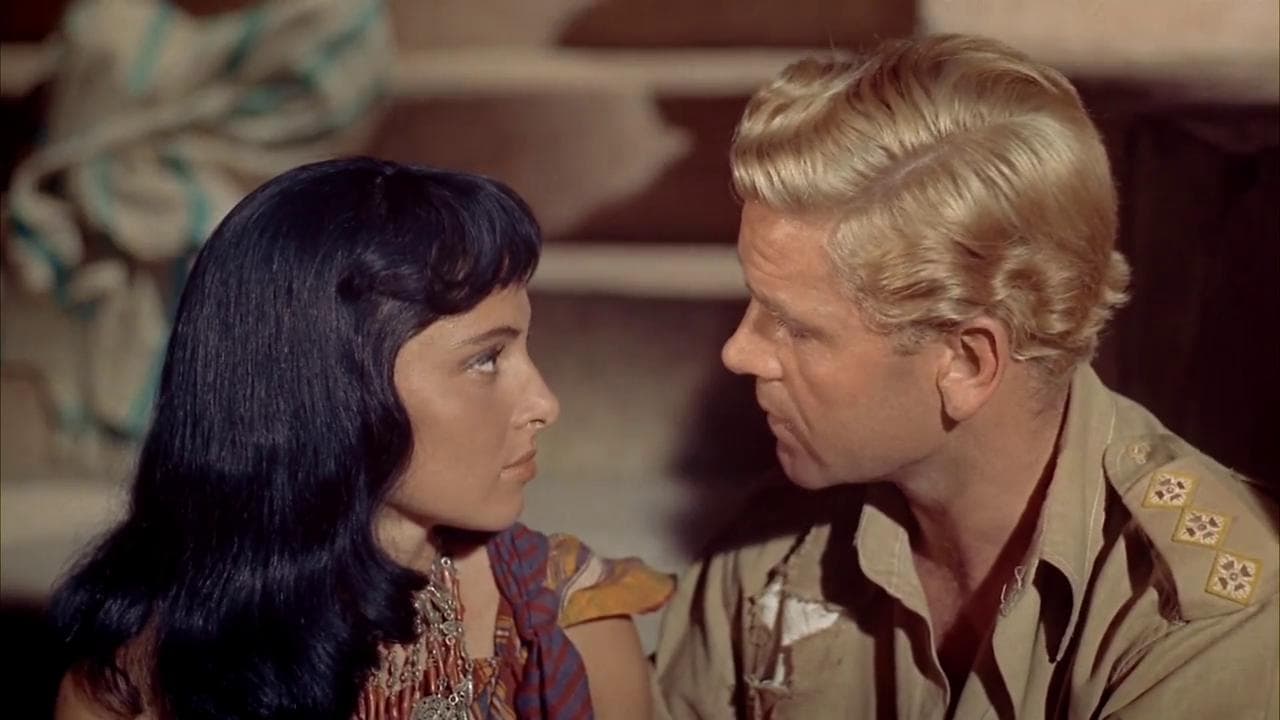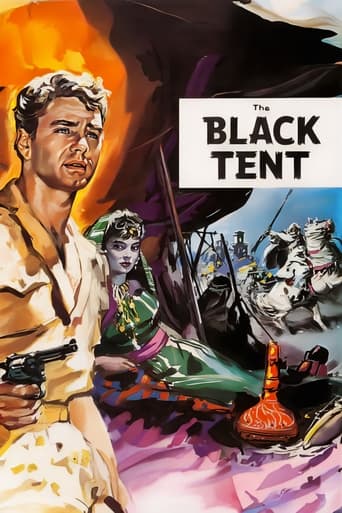

Brian Desmond Hurst made many great films but was not much of a director. He often took care of immensely great and interesting stories with great action and fascinating intrigue and had a knack for getting outstanding music to them as well, but his films are annoyingly impersonal, as if he didn't care about the actors but just focused on getting it all done and the story told. This is one of those films, typical of him, telling a great story, featuring characters of considerable interest, but coming out with only a very conventional and almost expressionless product. He just couldn't dramatize.There are many other assets to this film, though, like the photography with the epic and extremely romantic environment, the most romantic scenes taking place in the ruins of an ancient amphitheatre, the most spectacular part of the film, and dwelling long on a very comprehensive Libyan wedding among the bedouins. We don't have many films from Libya, this is from long before the days of Khadaffi and Isis and all that jazz, and what you are shown is a paradise among the bedouins in the shadow of the dramatic turnings of the second world war by Tobruk and El Alamein.What especially lifts this film is the splendid music by William Alwyn adding another dimension of colours to the already resplendently colourful film, enhancing especially the romantic scenes with that extra touch which the actors and dialogue are not able to provide.The script is by Bryan Forbes together with the author of the novel, Robin Maugham, and there is nothing wrong with the script, the saga being so humanly interesting as it is, but such a tale could have been made so much more of. It's the stuff of Lawrence of Arabia, Rudolf Valentino's sheiks and even of Charlton Heston's Moses in the desert.Of course you come to think of Hurst's other films, like "Dangerous Moonlight" (with the Warsaw Concerto), "Simba" (of Mau-Mau in Kenya), the Malta Story with Alec Guinness, Hungry Hill and The Lion has Wings, and they all suffer from the same thing: great stories, but crippled by lack of flesh to the bones, as if the director thought the actors were of secondary importance to the epic.Nevertheless, it's definitely worth giving a chance, for its exotic settings, its great story (with a surprisingly apt end), its splendidly coloured desert environments, its romance among the ruins, and its very vivid music, the most alive part of the film.
... View MoreBut I'm just being facetious! Brian Desmond Hurst directs, Anthony Steel and André Morell star, Bryan Forbes and Robin Maugham write, William Alwyn scores the music and Desmond Dickinson photographs in VistaVision Technicolor.It looks lovely, the Libya locations amazing, yet it's a dull and uneventful movie. Story concerns Capt. David Holland (Steel), who during WWII in the North African campaign gets injured and winds up being nursed by some Bedouin natives. He promptly becomes part of the crowd, falls in love with the Sheik's daughter and instigates a repel the Nazis front with the natives. But what happened next? Holland's brother, Col. Sir Charles (Donald Sinden), travels to Libya to find out.What he finds is obviously what we find out, that there's an inter racial romance at the heart of the story, some mistrust, loyalties born, a small scale battle and a double edged sword of a finale. It's all very contrived and mismatched, while some of the acting comes dangerously close to being parody supreme. Not good really and the tech guys deserve a better movie, and so do we. Oh well, if nothing else it obviously inspired Lawrence of Arabia. Hee hee hee. 5/10
... View MoreThis film can be summed up as follows: sumptuous photography; turgid plot; wooden acting.The mystery is how they could string it out for two hours. The story is that there isn't a story - it's just a travelogue across the Libyan desert. Michael Craig, who was hot property in British cinema back then, is a blacked-up Arab sheik and has no lines that I can remember. Blink and you miss him. I just couldn't work out what Anthony Steele would see in the love interest. Donald Sinden looks as though he has the mood of someone who has got out of bed the wrong side every morning of the shoot.The only thing that must have stopped this from bombing at the box office was the novelty for the cinema-going public in grey, smog-ridden 1950s Britain of seeing 'real', 'desert' sand in colour, something they could have done on the sea front at Clacton or Bournemouth.
... View More"The Black Tent" was made several years before "Lawrence Of Arabia." Had it been made ten years later, it would have been accused of plagiarism. Instead it can be said in some respects to anticipate "Lawrence of Arabia".After The Second World War, the heir to an extensive British country estate complete with enormous house and agricultural land travels to Libya to learn what happened to his brother. With one Arab to guide him, he journeys by camel across the vast deserts to talk with a tribal chief - as also happened in "Lawrence". After various delays, he is given his brother's diary and learns the truth. During the war, his brother had become detached from his regiment and had been the sole Briton amongst Arabs - as was the case in "Lawrence Of Arabia" He had led Arab fighters in ambushes on enemy patrols - as also happened in "Lawrence Of Arabia". The brother had married the daughter of the tribal chief, and eventually had been killed in action against German soldiers. Again like "Lawrence Of Arabia" the cinematography - here in VistaVision and Technicolor - shows the vastness of the desert and makes it strangely beautiful.Unlike "Lawrence Of Arabia" "The Black Tent" had a journeyman director, and was made with little attention to detail or realism. All the Arabs speak English fluently and with Received Pronunciation! Even more ludicrously, the younger brother travels across the desert by camel wearing a suit and tie and city shoes! He does not even break into a sweat! More seriously, there is no tension in the movie. The action sequences are unimaginatively staged, and scenes where suspense should be agonising - such as when Germans enter the Arab camp and discover the British soldier's gun or when German soldiers visit an ancient ruin and take photographs of themselves within a few yards of the fugitive British soldier - are entirely free of tension."The Black Tent" is mildly entertaining and is certainly visually splendid, but it could and should have been much better.
... View More